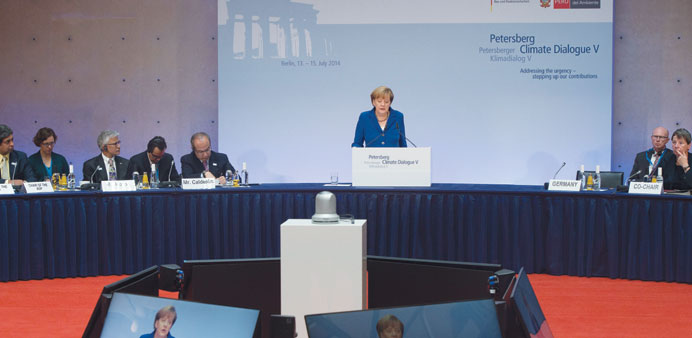Merkel delivers a speech during the 5th Petersberg Climate Dialogue in Berlin. The climate dialogue with representatives of 35 countries takes place in preparation of the UN Climate Summit in Peru.
DPA
Germany has stepped up calls for the international community to agree to ambitious targets for cutting greenhouse gas emissions, with Chancellor Angela Merkel pledging €750mn ($1.02bn) to help combat global warming.
“Now the world must show its colours,” Merkel told the fifth informal meeting in Berlin of representatives of 35 countries, which was held to discuss a new climate change treaty.
“Every delay comes at a high cost,” she said.
The €750mn form part of Germany’s contribution to build up the green climate fund, which has been set up to help developing nations address climate change.
Germany has spent €3.2bn in recent years on efforts to tackle climate change.
“In Germany we are accepting our responsibility,” the chancellor told the meeting, which is known as the Petersberg Climate Dialogue and which was created to overcome differences in the international community so that a new accord can be signed by the end of 2015.
The UN-sponsored green climate fund hopes to raise up to $100bn a year by 2020 to help with the promotion of climate-friendly businesses and to boost renewable energy.
“We cannot negotiate it with nature,” German Environment Minister Barbara Hendricks said as she opened the meeting.
The talks in Berlin are seen as a major test of the world’s willingness to sign up to a new accord.
“The procrastination must end,” she said.
Established after the failure of the 2009 climate change conference in Copenhagen, the Petersberg dialogue takes its name from the Petersberg government guesthouse near Bonn, where the first round of talks took place.
More than 190 countries have to set out their greenhouse gas reduction commitments by March next year in order to meet the UN convention’s goal of limiting the rise in global temperatures to two degrees Celsius above current levels.
“We are definitely on the right track for a climate agreement in 2015,” Hendricks told those attending the two-day conference.
Her cautious optimism follows the new climate initiatives set out by the world’s two biggest economies and polluters – the US and China.
US President Barack Obama recently unveiled his Clean Power Plan, under which he wants the US to reduce its carbon dioxide (CO2) emissions by 30% by 2030.
China is also moving to promote renewable energy as part of its efforts to come to grips with CO2 emissions from the nation’s booming economy.
Merkel wants to use Germany’s current presidency of the Group of Seven leading industrial nations to ensure that a new agreement is concluded at the 2015 UN Climate Change Conference, in France in December.
This would be the first time in more than two decades of climate change talks that the 194 nations attending the conference would be called upon to agree to binding targets for cuts in greenhouse gases.
Merkel, a former environment minister, will chair a summit of G7 leaders in Bavaria in June next year, ahead of the climate change summit.
Talks on a successor to the Kyoto accord, which runs out in 2020, are set to gather pace in the coming months.
However, underlining the difficulties involved in reaching a deal, little progress was registered at a two-week conference of environment ministers in Warsaw last November.
Another preparatory climate change conference is due in Lima this November.
“I hope that the heads of state try to come together, including with the private sector, but I think the leadership of countries like China and the US is very important – and they can bolster this leadership by making national commitments,” Peruvian President Ollanta Humala told DPA yesterday.
Global warming is also expected to be on the agenda at the November Group of 20 summit in Australia.
However, Australia’s conservative prime minister, Tony Abbott, who is hosting the G20, has been attempting to build an international coalition of global warming sceptics ahead of the meeting in Brisbane.
Germany’s credentials as a country spearheading moves to tackle global warming were somewhat tarnished by data showing that its CO2 emissions had risen for a second consecutive year in 2013.
More recently, however, Berlin has attempted to show its support for cutting global emissions with new policy action, including closely examining the financing of coal-fired power plants around the world by the state-owned development bank KfW bank.

